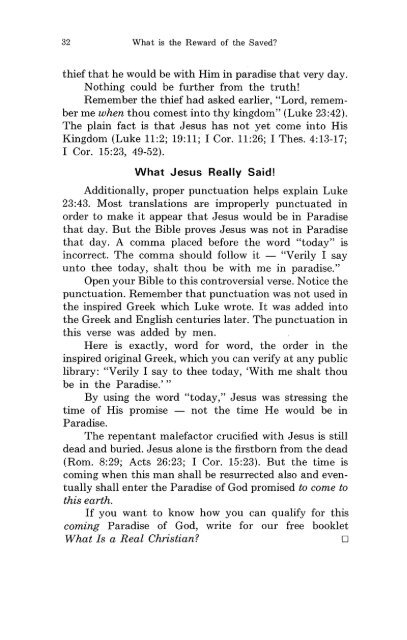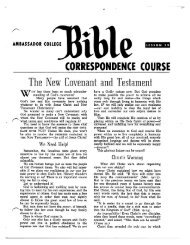What is the Reward of the Saved (1973)_b.pdf - Herbert W. Armstrong
What is the Reward of the Saved (1973)_b.pdf - Herbert W. Armstrong
What is the Reward of the Saved (1973)_b.pdf - Herbert W. Armstrong
Create successful ePaper yourself
Turn your PDF publications into a flip-book with our unique Google optimized e-Paper software.
32 <strong>What</strong> <strong>is</strong> <strong>the</strong> <strong>Reward</strong> <strong>of</strong> <strong>the</strong> <strong>Saved</strong>?<br />
thief that he would be with Him in parad<strong>is</strong>e that very day.<br />
Nothing could be fur<strong>the</strong>r from <strong>the</strong> truth!<br />
Remember <strong>the</strong> thief had asked earlier, "Lord, remember<br />
me when thou comest into thy kingdom" (Luke 23:42).<br />
The plain fact <strong>is</strong> that Jesus has not yet come into H<strong>is</strong><br />
Kingdom (Luke 11:2; 19:11; I Cor. 11:26; I Thes. 4:13-17;<br />
I Cor. 15:23, 49-52).<br />
<strong>What</strong> Jesus Really Said!<br />
Additionally, proper punctuation helps explain Luke<br />
23:43. Most translations are improperly punctuated in<br />
order to make it appear that Jesus would be in Parad<strong>is</strong>e<br />
that day. But <strong>the</strong> Bible proves Jesus was not in Parad<strong>is</strong>e<br />
that day. A comma placed before <strong>the</strong> word "today" <strong>is</strong><br />
incorrect. The comma should follow it - "Verily I say<br />
unto <strong>the</strong>e today, shalt thou be with me in parad<strong>is</strong>e."<br />
Open your Bible to th<strong>is</strong> controversial verse. Notice <strong>the</strong><br />
punctuation. Remember that punctuation was not used in<br />
<strong>the</strong> inspired Greek which Luke wrote. It was added into<br />
<strong>the</strong> Greek and Engl<strong>is</strong>h centuries later. The punctuation in<br />
th<strong>is</strong> verse was added by men.<br />
Here <strong>is</strong> exactly, word for word, <strong>the</strong> order in <strong>the</strong><br />
inspired original Greek, which you can verify at any public<br />
library: "Verily I say to <strong>the</strong>e today, 'With me shalt thou<br />
be in <strong>the</strong> Parad<strong>is</strong>e.'"<br />
By using <strong>the</strong> word "today," Jesus was stressing <strong>the</strong><br />
time <strong>of</strong> H<strong>is</strong> prom<strong>is</strong>e - not <strong>the</strong> time He would be in<br />
Parad<strong>is</strong>e.<br />
The repentant malefactor crucified with Jesus <strong>is</strong> still<br />
dead and buried. Jesus alone <strong>is</strong> <strong>the</strong> firstborn from <strong>the</strong> dead<br />
(Rom. 8:29; Acts 26:23; I Cor. 15:23). But <strong>the</strong> time <strong>is</strong><br />
coming when th<strong>is</strong> man shall be resurrected also and eventually<br />
shall enter <strong>the</strong> Parad<strong>is</strong>e <strong>of</strong> God prom<strong>is</strong>ed to come to<br />
th<strong>is</strong> earth.<br />
If you want to know how you can qualify for th<strong>is</strong><br />
coming Parad<strong>is</strong>e <strong>of</strong> God, write for our free booklet<br />
<strong>What</strong> Is a Real Chr<strong>is</strong>tian?<br />
D
















